Regulatory Investigations & Litigation

When the CCI initiates an investigation, the stakes are high from reputational damage to substantial monetary penalties. We represent clients through every stage of competition law enforcement: responding to initial inquiries, defending against full-scale cartel or abuse of dominance allegations, and navigating appellate proceedings.
Our approach blends legal acumen with crisis management skills, enabling us to protect our clients’ commercial interests while minimising public exposure. We also advise whistle-blowers and complainants, ensuring strategic and compliant engagement with the regulator.
Our Services
- Regulatory Representation: Acting before the CCI, National Company Law Appellate Tribunal, and higher courts including the Supreme Court in competition law disputes.
- Cartel Defence: Managing cartel investigations involving alleged collusion or bid-rigging or information exchange between competitors.
- Vertical Restraints and Abuse of Dominance Cases: Defending or prosecuting claims involving market foreclosure, discriminatory pricing, or unfair platform practices.
- Third-Party Complaints: Assisting clients in filing complaints against anti-competitive conduct of enterprises. .
- Settlement & Leniency Applications: Guiding companies in applying for leniency or exploring settlement opportunities to reduce penalties.
Key Highlights
- Defended clients in precedent-setting CCI cases.
- Deep experience with sensitive, high-profile matters requiring confidential handling.
- Strong working relationships with regulatory officials and industry bodies.
- Skilled in multi-jurisdictional coordination for multinational companies to ensure consistent positions are taken in investigations.








